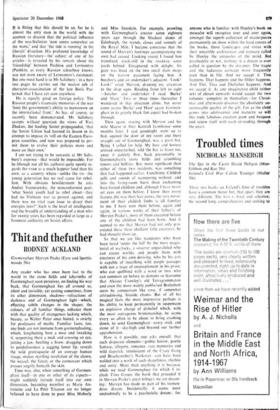Thit and thefuther
RODNEY ACKLAND
Any reader who has once been lost to the world in the stone fields and labyrinths of Gormenghast soon perceives, on finding his way back, that Gormenghast lies all around us, silent and invisible, yet casting sometimes; from its other dimension, shadows—refractions of darkness and of Gormenghast light—which, effecting subtle changes in the shapes, the colours, of all familiar things, enhance them with that quality of strangeness lacking which, beauty, as Walter Pater once hinted, is strictly for professors of maths. Familiar faces, too, one finds are not immune from gormenghasting, which, lengthening here a nose and tweaking it, serpenting there a neck and crossing an eye, jutting a jaw, beetling a brow, dragging down to pendulousness a sagging lower lip, reveals the wild grotesquerie of an average human visage; makes startling revelation of the clown, the weasel, the fatcat, or the cormorant which presses angrily beneath the skin.
Time was, also, when something of Gormen- ghast itself—in one or other of its aspects— might suddenly intrude itself into our own dimension, becoming manifest as Marie An- toinette and Le Petit Trianon are no longer believed to have done to poor Miss_ Moberly
and Miss Jourdain. For example, prowling with Gormenghast's creator some eighteen
years ago through the blackest slums of
Edinburgh. the wynds, closes and vennels of the Royal Mile, I became conscious that the
sound of Mervyn's footsteps accompanying my
own had ceased. Looking round I found him transfixed, stock-still in the roadway some
yards behind. Enraptured with delight, his gaze was fixed on the two small slum shops on the narrow pavement facing him. A butcher's and an undertaker's adjacent. 'Look!
Look!' cried Mervyn, drawing my attention to the shop signs. Reading from left to right
—butcher and undertaker—I read 'Burke' and 'Hare.' Two or three times thereafter I wandered in that direction alone. but never came across 'Burke' and 'Hare' again. Gormen- ghast in its grizzly black fun aspect had broken through.
Then again. staying with Mervyn and his wife Maeve at their Kentish farmhouse some months later, 1 said goodnight. went up to bed, opened the door of my room and there straight out of Gormenghast, was a great bat, flying. I yelled for help. My host and hostess arrived unperturbed. told the bat to leave me, away it politely flew, back presumably to Gormenghast's stone fields and crumbling towers and belfries. But, more significant than either of these two incidents, was something that had happened earlier. Lunchtime. Childish yells and sounds of scampering without, and into the living-room burst three enchanting bare-footed children and, although I have never set eyes on them before. I know their every feature, the way their hair grows, the very move- ment of their childish limbs is all familiar to me. I have seen them before, again and again, in various works of their father's, of Mervyn Peake's, most of them executed before any of the children had been born. And it seemed to me that Mervyn had not only pro- created these three ebullient little creatures, he had thought them up.
So that we are like wanderers who have been lured `under the hill' by the most magis- terial of warlocks. a sorcerer unparalleled who can create worlds, and people them with creatures of his own devising, who by his arts is capable of inscribing wild purple passages with not a trace of empurplement in his prose, who can spellbind with a word or two. who can summon up before us demons so fearsome that Aleister Crowley's old Tetragrammaton and even the more widely publicised Beelzebub seem by comparison like cosy. if somewhat attitudinising. fireside chums. But of all his magical feats the most, impressive perhaps is his ability to keep permanently in suspension an explosive charge of disbelief which, with the most outrageous brinkmanship, he seems every so often to be about to bring crashing down, to send Gormenghast—every stick and stone of it—sky-high and beyond our further apprehension.
How is it possible, one asks oneself, that such disparate elements—gothic horror, poetic fantasy, allegory, romance, race memories and wild slapstick. reminiscent of the Crazy Gang and Beachcomber's Narkover-- can have been welded into a work of such shapeliness, rhythm and unity. More than anything it is because. while we read Gormenghast (in which I in- clude Titus Groan, the book that preceded it in Mervyn Peake's great trilogy), we are dream- ing: Mervyn has made us part of his tremen- dous dream. Incidentally, it seems most undoubtedly to be a psychedelic dream: for anyone who is familiar with Huxley's book on mescalin will recognise over and over again, amongst the superb collection of masterpieces permanently on show within the hard covers-of the books, those landscapes and vistas with their unearthly architecture and statuary called by Huxley the antipodes of the mind. But psychedelic or not, nothing in a dream is ever called in question by the dreamer. The tragic and the ludicrous coincide more frequently even than in life. And we accept it. This happens, That happens and the Other happens. And Thit, Thas and Thefuther happens. And we accept it. As any imaginative child (either sex) of eleven upwards would accept the two volumes—complete in themselves—for Christ- mas and afterwards discover the absolutely un- surpassable quality of the gift. For as the child grows into adolescence and maturity so will this truly fabulous creation grow and burgeon and renew itself with each re-reading through the years.


































 Previous page
Previous page